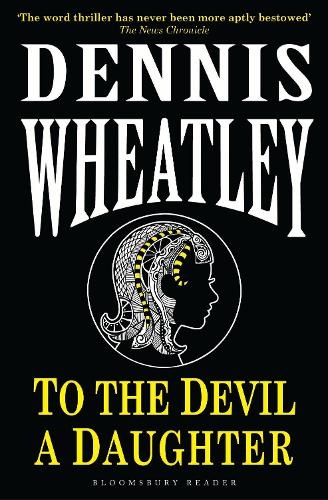
To the Devil, a Daughter
(Paperback)
Publishing Details
To the Devil, a Daughter
By (Author) Dennis Wheatley
Bloomsbury Publishing PLC
Bloomsbury Reader
10th October 2013
10th October 2013
United Kingdom
Classifications
General
Fiction
Thriller / suspense fiction
Mysticism, magic and occult interests
823.912
Physical Properties
Paperback
304
Width 130mm, Height 196mm, Spine 22mm
260g
Description
'One of the most popular storytellers of the century.' - The Telegraph A businessman makes a deal with a satanic clergymen, and has his daughter baptised into Satans church. Twenty-one years later, provided she is still a virgin, she is destined to be the centrepiece of a hideous satanic ritual. Molly Fountain, a tough-minded Englishwoman who worked for the British Intelligence during the war, has retreated to her French cottage to write. Next door she finds a new, mysterious neighbour, an intriguing young girl named Christina. Why did the solitary girl leave her rented house only for short walks at night Why was she so frightened Why did animals shrink away from her Molly and her son are determined to save Christina from the clutches of what promises to be a fate worse than death.
Reviews
One of the most popular storytellers of the century. * The Telegraph *
He forcibly abducts the imagination. * The Evening Standard *
The word thriller has never been more aptly bestowed. * The News Chronicle *
The greatest adventure writer of his time. * Daily Mail *
Never lets you down. * Evening Standard *
Author Bio
Dennis Yates Wheatley (18971977) was an English author whose prolific output of stylish thrillers and occult novels made him one of the world's best-selling writers from the 1930s through the 1960s. His Gregory Sallust series was one of the main inspirations for Ian Fleming's James Bond stories. Born in South London, he was the eldest of three children of an upper-middle-class family, the owners of Wheatley & Son of Mayfair, a wine business. He admitted to little aptitude for schooling, and was expelled from Dulwich College. Soon after his expulsion Wheatley became a British Merchant Navy officer cadet on the training ship HMS Worcester. During the Second World War, Wheatley was a member of the London Controlling Section, which secretly coordinated strategic military deception and cover plans. His literary talents gained him employment with planning staffs for the War Office. He wrote numerous papers for the War Office, including suggestions for dealing with a German invasion of Britain. During his life, he wrote more than 70 books which sold over 50 million copies.
